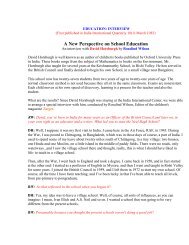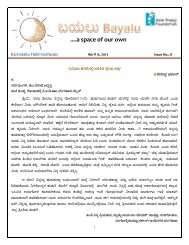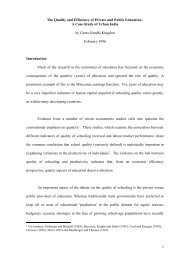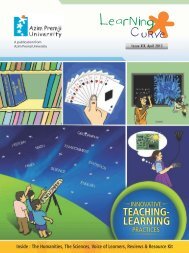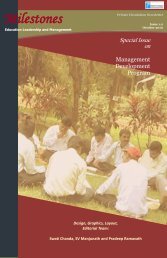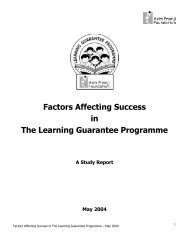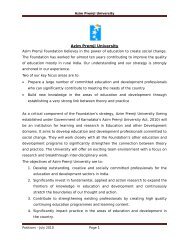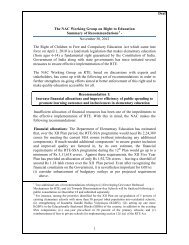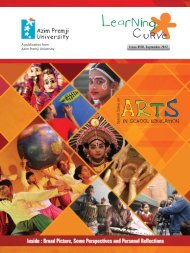Indesign Pagesnew.indd - Azim Premji Foundation
Indesign Pagesnew.indd - Azim Premji Foundation
Indesign Pagesnew.indd - Azim Premji Foundation
You also want an ePaper? Increase the reach of your titles
YUMPU automatically turns print PDFs into web optimized ePapers that Google loves.
civics, the term political science be used. civics appeared in<br />
the Indian school curriculum in the colonial period against the<br />
background of increasing ‘disloyalty’ among Indians towards<br />
the Raj. Emphasis on obedience and loyalty were the key<br />
features of civics. Political science treats civil society as the<br />
sphere that produces sensitive, interrogative, deliberative,<br />
and transformative citizens.<br />
Gender concerns need to be addressed in terms of making<br />
the perspectives of women integral to the discussion of any<br />
historical event and contemporary concerns. This requires<br />
an epistemic shift from the patriarchal preconceptions that<br />
inform much of the social studies at present. Concerns related<br />
to the health of children and social aspects of changes during<br />
adolescence (like changing relationships with parents, peer<br />
group, the opposite sex and the adult world in general) need<br />
to be addressed appropriately. The concept of human rights<br />
has a universal frame of reference and the NCF recommends<br />
that children are introduced to universal values in a manner<br />
appropriate for their age.<br />
The NCF envisions the study of social sciences to<br />
enable children to<br />
•<br />
•<br />
•<br />
•<br />
•<br />
•<br />
•<br />
•<br />
•<br />
Understand the society in which they live<br />
Learn how society is structured, managed, and<br />
governed<br />
Understand forces seeking to transform and redirect<br />
society in various ways<br />
Appreciate values enshrined in the Indian Constitution<br />
Grow up as active, responsible, and refl ective members<br />
of society<br />
Learn to respect differences of opinion, lifestyle, and<br />
cultural practices<br />
Question and examine received ideas, institutions, and<br />
practices<br />
Acquire pleasure in reading, by providing them with<br />
enjoyable reading material<br />
Undertake activities that will help them develop social<br />
and life skills<br />
The objectives of teaching social sciences at various stages<br />
as detailed in the NCF are:<br />
1. Primary Stage<br />
•<br />
Develop skills of observation, identifi cation, and<br />
Section A<br />
Social Sciences and the National Curriculum Framework<br />
•<br />
•<br />
classifi cation<br />
Develop in the child a holistic understanding of the<br />
environment with emphasis on the interrelationship of<br />
the natural and the social environments<br />
Sensitise the child to social issues and develop in him/<br />
her a respect for difference and diversity<br />
2. Upper Primary Stage<br />
•<br />
•<br />
•<br />
•<br />
Develop an understanding about the earth as the habitat<br />
of humankind and other forms of life<br />
Initiate the learner into a study of her/his own region,<br />
state, and country in the global context<br />
Initiate the learner into a study of India’s past, with<br />
references to contemporary developments in other parts<br />
of the world<br />
Introduce the learner to the functioning and dynamics<br />
of social and political institutions and processes of the<br />
country<br />
At this stage, the subject areas of the social sciences—<br />
drawing their content from history, geography, political<br />
science, and economics—will be introduced.<br />
3. Secondary Stage<br />
•<br />
•<br />
•<br />
•<br />
•<br />
•<br />
•<br />
Develop analytical and conceptual skills to<br />
Understand the processes of economic and social change<br />
and development<br />
Critically examine social and economic issues and<br />
challenges<br />
illiteracy<br />
like poverty, child labour, destitution,<br />
Understand the rights and responsibilities of citizens in a<br />
democratic and secular society<br />
Understand the roles and responsibilities of the state in<br />
the fulfi llment of constitutional obligations<br />
Understand the processes of change and development<br />
in India in relation to the world economy and polity<br />
Appreciate the rights of local communities in relation to<br />
their environment, the judicious utilisation of resources,<br />
as well as the need for the conservation of the natural<br />
environment<br />
At the secondary stage, the social sciences comprise elements<br />
of history, geography, political science, and economics. The<br />
Pg No: 37



